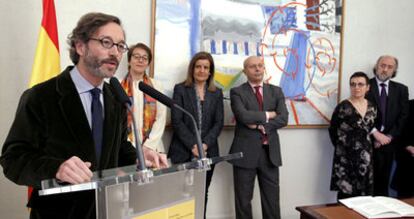Books, archives and libraries shredded by government's culture cutbacks
Writers' Board chief fears Spain is "heading back to a national-Catholic state"
Institutional culture is resting on an ever thinner frame. After reducing the Culture Ministry to a secretariat that answers to the new Education, Culture and Sports Ministry, the center-right government of the Popular Party (PP) is now eliminating the Directorate General of Books, Archives and Libraries, one of three specialized bureaus that were dependent on the ministry.
The directorate's responsibilities - the promotion of books and the management of national archives and libraries - have been broken up and handed over to the two remaining bureaus, whose tasks, and names, have been expanded: the Directorate General of Cultural Policy, Industry and Books on the one hand, and the Directorate General of Fine Arts, Cultural Assets, Archives and Libraries on the other.
Both agencies will answer directly to the new secretary of state for culture, José María Lassalle. "This is not a strategic focus," said Lassalle in a telephone interview, calling the measure "a reorganization" instead.
"Above all, this is about making a more efficient use of public resources and reorganizing structures to rationally improve some synergies that were already shared," he said.
Last Friday, the government warned that the new Education, Culture and Sports Ministry will see 485.9 million euros cut from the 3.7 billion euros in its extended budget, as part of a drastic set of austerity measures aimed at curbing the public deficit in 2012.
The decision to break up the book directorate, said Lassalle, was part of that "budgetary non-availability." However, it is highly unlikely that other cultural directorates will be affected by the cuts, and unclear how much will be saved by the decision to slash the highly symbolic agency.
The new team in charge of cultural policies believes that if Spain has one cultural sector that stands above all others, it is the book industry, which is highly competitive and open to the Latin America market. Also, the ministry run by José Ignacio Wert considers that weaving fine arts, archives and libraries into the same directorate general is an exercise in pure logic and a form of cultural management that already existed in the past.
In general terms, the elimination of a bureau that dealt with a vital part of culture - the publishing industry - caused a few angry outcries, but was applauded by the publishing industry itself.
"Ideally, books and libraries would go together, but as a solution I don't find it bad," said Antonio María Ávila, director of the federation of publishers FEGG. "By putting books in together with cultural industries, they are being included in the more powerful of the two directorates, because archives really don't have much to do with books anyway. And to have books included in the cultural industries directorate is an acknowledgment of the reality of this country, where books represent the top cultural industry."
Pilar Gallego, vice-president of the booksellers' association of Madrid, is deeply unhappy about the measure, however. "This is very negative for books; it reflects a view of books as a secondary product. It would make more sense to eliminate the cultural industry directorate, since it has not had a relevant track record, unlike the books directorate."
Gallego is not exactly enthusiastic either about the separation of powers that had been linked until now, such as books, archives and libraries. "It does not make sense to separate books from libraries," she says.
But the greatest detractor was Andrés Sorel, the secretary general of the Writers' Board of Spain, who passionately rejects this decision. "We think it is simply barbarous to eliminate the book at a time when it needs to be encouraged and defended. It's like going back to the barbarian ages. All that is left now for them [the PP] to do is to reintroduce censorship. We're heading back to a national-Catholic state, and I can see how books would bother such a type of person. Anyone who reads books will uncover the language used by those who are now in power. It is a cover-up language that naïve people take to be an absolute truth. Ever since the days of Unión de Centro Democrático (a party in power when democracy was first restored in Spain), the general directorate of books has played a vital role. I cannot understand this measure. This is something more than a symbol."
The General Directorate for Cultural Industries and Policies was created by then-Culture Minister César Antonio Molina and the agency survived the Socialist government's first cuts to the Culture Ministry's structure. Until now, this agency was in charge of promoting cultural industries, sponsorship, intellectual property issues and international cultural communication.

Tu suscripción se está usando en otro dispositivo
¿Quieres añadir otro usuario a tu suscripción?
Si continúas leyendo en este dispositivo, no se podrá leer en el otro.
FlechaTu suscripción se está usando en otro dispositivo y solo puedes acceder a EL PAÍS desde un dispositivo a la vez.
Si quieres compartir tu cuenta, cambia tu suscripción a la modalidad Premium, así podrás añadir otro usuario. Cada uno accederá con su propia cuenta de email, lo que os permitirá personalizar vuestra experiencia en EL PAÍS.
¿Tienes una suscripción de empresa? Accede aquí para contratar más cuentas.
En el caso de no saber quién está usando tu cuenta, te recomendamos cambiar tu contraseña aquí.
Si decides continuar compartiendo tu cuenta, este mensaje se mostrará en tu dispositivo y en el de la otra persona que está usando tu cuenta de forma indefinida, afectando a tu experiencia de lectura. Puedes consultar aquí los términos y condiciones de la suscripción digital.








































